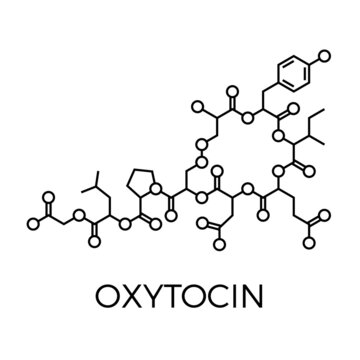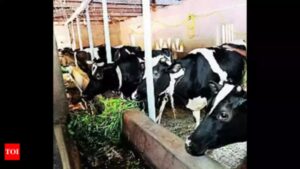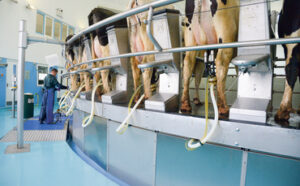
What’s in the milk being supplied in Delhi? Oxytocin, says a report filed in the Delhi High Court. The drug was banned by the Central government in April 2018, saying that it was being misused on milch cattle to increase yield, which not only affects the health of the cattle but also humans who consumed the milk.
While hearing a plea over “rampant use of Oxytocin hormone in the dairy colonies” in the national capital, the Delhi High Court has now called for action against its spurious use in dairy colonies and observed that its administration amounts to “animal cruelty”.
The Centre had decided that only one public sector undertaking, the Karnataka Antibiotics and Pharmaceuticals Limited (KAPL), would be permitted to produce Oxytocin to meet the needs of the entire country. Also known as the ‘love hormone’, Oxytocin is secreted by the pituitary glands of mammals during sex, childbirth, lactation or social bonding, and could be chemically manufactured and sold by pharma companies for use during childbirth. It is administered either as an injection or a nasal solution.
The HC noted the Court Commissioner’s submission that Oxytocin is administered to cattle to “force milk let-down and increase the production of milk”.
The bench, thereafter, directed: “Since administering of Oxytocin amounts to animal cruelty, and is a cognisable offence under Section 12 of the Prevention of Cruelty to Animals Act, 1960, consequently, this court directs the Department of Drugs Control, GNCTD, to conduct weekly inspections and ensure that all cases of spurious Oxytocin usage or possession are registered under Section 12 of the Prevention of Cruelty to Animals Act, 1960, and Section 18(a) of the Drugs and Cosmetics Act, 1940.”
The HC further observed that these offences will be investigated by jurisdictional police stations, wherein the dairy colonies are situated. “The Intelligence Department of Delhi Police is directed to identify the sources of such spurious Oxytocin production, packaging, and distribution and take action in accordance with the law,” ordered the HC.
The court was of the view that dairies should be “relocated” in areas having proper sewage, drainage, biogas plant, ample open space for the cattle to move around, and enough grazing area. It noted that as per the Court Commissioner, the condition of all the nine designated dairy colonies in Delhi — Kakrola Dairy, Goela Dairy, Nangli Shakrawati Dairy, Jharoda Dairy, Bhalaswa Dairy, Ghazipur Dairy, Shahbad Daulatpur Dairy, Madanpur Khadar Dairy and Masoodpur Dairy — was “bad”. It, however, said that there was an “urgent need to rehabilitate and relocate the Ghazipur Dairy and Bhalaswa Dairy forthwith” as they were located next to the Sanitary Landfill Sites (SLFs).
“Cattle in dairies situated next to landfill sites, without doubt, would feed on hazardous waste and their milk if consumed by humans, particularly children, (directly or indirectly) could have serious consequences. Keeping in view the apprehension that dairies next to landfill sites can cause illness and public health hazards, this court is prima facie of the view that these dairies need to be relocated forthwith,” observed the bench.
However, before issuing any direction, the bench said that it would like to hear from officials concerned on how the directions would be implemented. The HC, thereafter, directed the Commissioner (MCD), Director of Veterinary (MCD), Chief Secretary (GNCTD), CEO (DUSIB), and CEO (FSSAI) to join the proceeding on the next hearing at 4 pm on May 8 through video conferencing. “The officials shall explore the possibility of availability of land where the dairies could be rehabilitated and relocated. The Chief Secretary shall also hold a prior meeting with relevant officials before appearing before this court,” said the HC.





